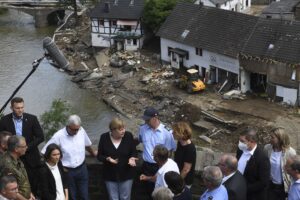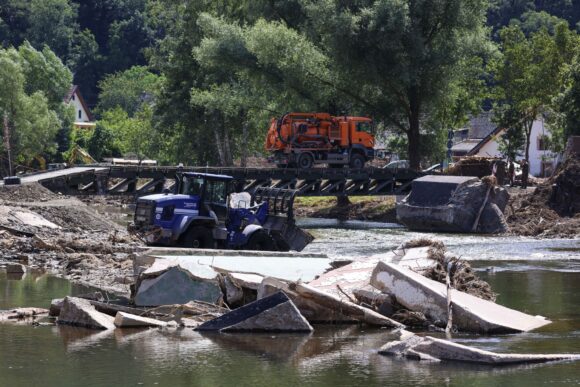The heavy rains and floods that killed at least 220 people in Belgium and Germany this summer were made more likely and more intense by climate change.
These are the conclusions of a rapid attribution report put together in just over a month by a group of 39 scientists collaborating under the World Weather Attribution initiative. Climate change made the floods between 1.2 and nine times more likely to happen, while it increased the intensity of the event by between 3% and 19%.
“The possibility indicated by these ranges is that these things are becoming more frequent,” said Maarten van Aalst, director of the international Red Cross Red Crescent Climate Centre and a professor at University of Twente in the Netherlands. “We don’t know how rapidly and we don’t know in which side of the range we are, but it’s a possibility we now need to take into account.”
The report’s findings are in line with the sixth assessment by the United Nations’ Intergovernmental Panel on Climate Change, or IPCC, which was released earlier this month and concluded with high confidence that extreme precipitation and floods will increase in western and central Europe if warming reaches 2°C from pre-industrial times. While the attribution of specific weather events to climate change is becoming faster, it is still difficult and in some ways limited.
Earlier this year, analysis by WWA concluded that the heatwave that hit North America in June was made at least 150 times more likely by climate change. Because the German floods were the first time these fast attribution methods were applied to a summer flood, scientists encountered challenges when conducting the analysis.
“Heatwaves are much more directly connected to increases in global mean temperatures,” Sarah Kew, a climate scientist at the Royal Netherlands Meteorological Institute, told journalists on Monday. “With precipitation, there are more dynamical factors that come into play and there’s more local-scale variability.”
Scientists focused on the heavy rainfall that fell from July 12 to 15 in some of the areas more affected by floods such as the Ahr and Erft rivers in Germany and Belgium’s Meuse. The study used different models to simulate the likelihood and intensity of the event. It didn’t analyze flood data partly because some measurement stations along rivers in these regions were destroyed by the downpours.

The rainfall broke historical records in these regions by large margins. In just a matter of hours, relatively small rivers were carrying amounts of water equivalent to the Rhine’s, Germany’s largest river. Such an event can be expected to happen once every 400 years within western Europe, the scientists concluded.
“We aren’t safe and we can expect this to happen again, but we’re not saying it is likely that it will happen again next year,” Van Aalst said. “It’s still a rare event, but a rare event we should be prepared for.”
In July, a low-pressure system slowly approached from France toward Germany and became stuck for a long period of time—days as opposed to hours—over Germany, Belgium and the Netherlands. At the same time, warm and very humid masses of air reached the region from the Mediterranean, feeding the atmosphere with even more water.
When the rain fell, it did so over soil that had been previously soaked after three weeks of recurring precipitation. The saturated ground could hardly absorb any additional water, leading to the devastating floods.
“We thought that our experience from the past would help us prepare for the worst-case scenario that we might get in the future,” Van Aalst said. “That’s no longer the case” when it comes to extreme weather, he said. “We need to rationally plan for rather than wait until experience has taught us, because then it’s often too late.”
Top photograph: A pontoon, installed by the German military, after floods swept a bridge and devastated parts of western Germany, in Insuld, Germany, on Friday, July 30, 2021. Chancellor Angela Merkel’s cabinet approved a 400 million euros ($470 million) flood-relief package to help devastated regions in western Germany. Photo credit: Alex Kraus/Bloomberg.
Topics Flood Climate Change
Was this article valuable?
Here are more articles you may enjoy.



 Preparing for an AI Native Future
Preparing for an AI Native Future  How One Fla. Insurance Agent Allegedly Used Another’s License to Swipe Commissions
How One Fla. Insurance Agent Allegedly Used Another’s License to Swipe Commissions  ‘Structural Shift’ Occurring in California Surplus Lines
‘Structural Shift’ Occurring in California Surplus Lines  Portugal Deadly Floods Force Evacuations, Collapse Main Highway
Portugal Deadly Floods Force Evacuations, Collapse Main Highway 

